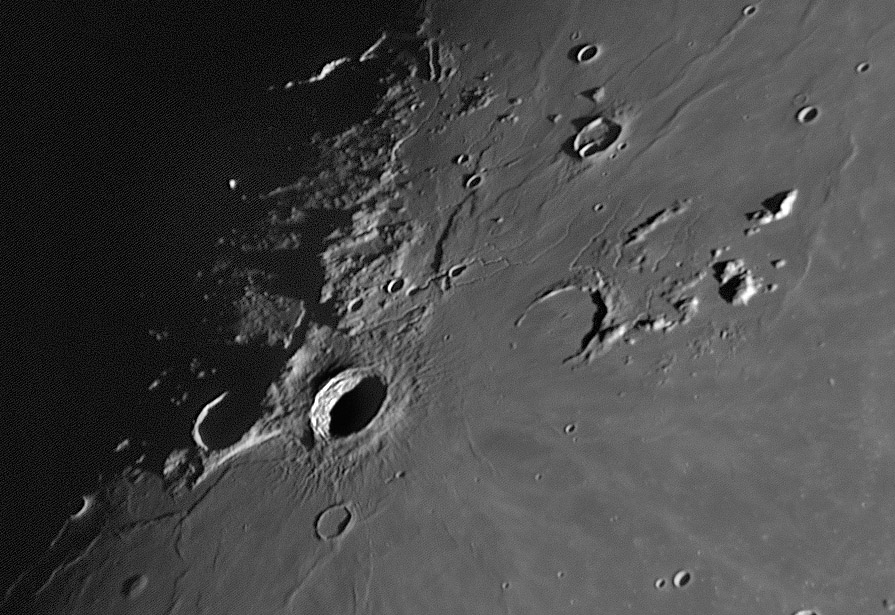Difference between revisions of "April 22, 2018"
| Line 7: | Line 7: | ||
<em>image by [mailto:kcpaulhk@yahoo.com.hk K.C. Paul], Hong Kong</em><br /> | <em>image by [mailto:kcpaulhk@yahoo.com.hk K.C. Paul], Hong Kong</em><br /> | ||
<br /> | <br /> | ||
| − | Here is [http://lpod. | + | Here is [http://www2.lpod.org/wiki/December_12,_2008 another] recent image by KC that raises questions for me. The lighting and librations were apparently just right to reveal a series of parallel linear features I hadn't appreciated before. The largest one is a diagonal ridge one to two Aristarchus crater diameters to the crater's north. Another parallel linear feature is Aristarchus Rille #I just above the crater, and most of the nearby rilles follow this trend. Look around and you can find a few ridges in the same alignment. Normally any linear structure in this quadrant of the Moon can be interpreted as being related to the formation of the Imbrium impact basin. But these lineations seem to point back to a spot north of the center of the basin's presumed [https://the-moon.us/wiki/Imbrium%2C_Mare impact point]. I can't think of any other force that might have formed these parallel lineations so for now will accept them as Imbrium related. Doing so cause me to make the comparison with similar radial lineations in the Apennines and [[March_19,_2006|Alpine]] mountains. If this speculation is correct it reinforces the thought that the Aristarchus Plateau is an uplifted block of crust outside the basin's rim. <br /> |
<br /> | <br /> | ||
<em>[mailto:tychocrater@yahoo.com Chuck Wood]</em><br /> | <em>[mailto:tychocrater@yahoo.com Chuck Wood]</em><br /> | ||
Latest revision as of 08:22, 28 October 2018
Radial Fractures?
Originally published December 14, 2008

image by K.C. Paul, Hong Kong
Here is another recent image by KC that raises questions for me. The lighting and librations were apparently just right to reveal a series of parallel linear features I hadn't appreciated before. The largest one is a diagonal ridge one to two Aristarchus crater diameters to the crater's north. Another parallel linear feature is Aristarchus Rille #I just above the crater, and most of the nearby rilles follow this trend. Look around and you can find a few ridges in the same alignment. Normally any linear structure in this quadrant of the Moon can be interpreted as being related to the formation of the Imbrium impact basin. But these lineations seem to point back to a spot north of the center of the basin's presumed impact point. I can't think of any other force that might have formed these parallel lineations so for now will accept them as Imbrium related. Doing so cause me to make the comparison with similar radial lineations in the Apennines and Alpine mountains. If this speculation is correct it reinforces the thought that the Aristarchus Plateau is an uplifted block of crust outside the basin's rim.
Chuck Wood
Technical Details
13:59 UT on 9 Dec 2008 -- 10" Newtonian with 2.5X barlow
Related Links
Rükl plate 18
Yesterday's LPOD: Faultless Image
Tomorrow's LPOD: Main Lunar Crater Sequence Animated
COMMENTS?
Register, Log in, and join in the comments.



